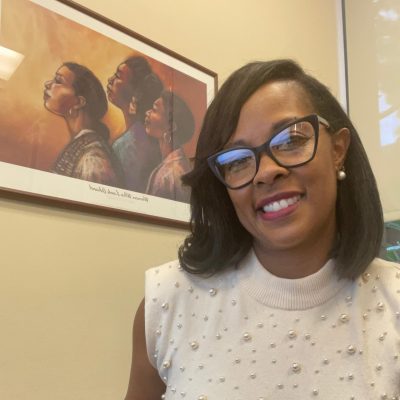4 Why Am I Here?
Finding My Motivation to Thrive
Tanisha Price-Johnson
I have fallen short in many ways as I’ve worked towards the goals I have made in my life. I have missed deadlines and hopscotched through interviews demonstrating my lack of due diligence. I often shrink away from the gracious recognition I have received for helping students or for launching a major initiative. Many times I downplay my many accomplishments because I simply do not want to be in the limelight. I work best in the background — sometimes, I strive to work in the shadows. I want to simply be regular.
When I find myself indulging in this negative self-talk, I instantaneously pivot and remember my grandfather, Campa, and his wise words: “You’re smart. Don’t waste your smarts on nonsense.” As early as I can remember, he encouraged me to do good in school and do my best. To him, being the best meant that you worked hard, even harder than he did. He did not believe in wasting life on nonsense and he drank his coffee black — it gave him the gusto to face each day. Our time together was always full of adventures and learning lessons. Spending time with Campa took my mind off of my mounting life goals and allowed me to be in the moment. It was in those moments that my life’s purpose began to take shape.
Campa spent 17 months in Germany fighting for the US during World War II. His service included guarding troops who patrolled a German concentration camp.
Living in San Diego, California, he was required to register for the draft in nearby Escondido. He was then sent to San Pedro — now a part of Los Angeles — where he took an aptitude test to qualify for officer training school.
After passing the test, he was sent to Fort Sill, Oklahoma to begin training to become an officer, but at the last moment, mysteriously, the class was canceled. From there he was sent to Camp Beal, near Sacramento, California, for 13 months of training to serve in a field artillery unit. He often wonders what happened, why officer training school was not available and how his life would have been different if given the chance to make a career in the Army as an officer.
My grandfather was a member of the 777th Field Artillery, serving in places like the European Theatre, the Siegfried Line and the Essen Pocket. He received the Good Conduct Medal and the Sharp Shooter Commendation and was honorably discharged in December, 1945. He said he wanted to make the military his career; unfortunately, he reflected, the country had different plans for him.
Campa was an everyman; he worked as a ranch hand, managed a unit on the railroad, and was a lead custodian at the UA College of Education. He said his life was “just fine” but that he wanted his children and grandchildren to go far in life. He encouraged me to become the “president at Pima College” because it would prepare me to be the president of UA. I would often laugh at this nonsensical encouragement and tell him that I did not aspire to work at that level. He would shake his head and remind me that I had the opportunity to do great things — why waste life being mediocre?
When I was working on my doctoral dissertation, I questioned my decision to engage in such a grueling process. I complained to Campa and he would always say that finishing my PhD was not for me; it was for my daughter’s sake. It made me realize that the purpose of my life was being played out for her. I was her role model — she said so herself in a third-grade essay. Campa helped me realize that I was setting expectations for my daughter’s life — I was showing her that she could and would be successful. The seeds had been planted.
My grandfather lived to be 99 years old — two months shy of his 100th birthday. I believe he was blessed to see his life’s purpose played out; he worked hard to create opportunities for his family. He taught me that when you are in motion — your goals, thoughts, actions — you are positively affecting someone. In this way, every plan and decision I have made has been with my daughter in mind.
Campa taught me that if I am too caught up in outcomes, then I would miss the differences I made through my experiences and journeys with my daughter. It is crucial for her to understand that she, even in her young life, is having an effect on someone who is watching her. She is making a difference and raising the bar that Campa set for me. My new reason for living is to make sure she excels and has every opportunity to be successful. It is the reason why I am here.


